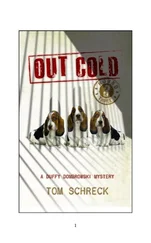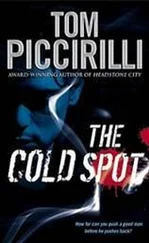After all this, finding Thorvall was very easy. Haki and Hekja ranged ahead, quartering back and forth through the undergrowth like a pair of hounds, and to all our surprise returned on the third day to say that they had found Thorvall on a nearby headland, but he had refused to come back with them. Thinking that Thorvall might be injured, we fought our way through the underbrush and arrived, exhausted and scratched, to find Thorvall lying stretched out on the ground on the flat crest of a small headland overlooking the sea. To the fury of the Christians, and the relief of his friends, Thorvall was in good health. Indeed, he looked remarkably relaxed as he lay on his back, gazing up at the sky and apparently talking to himself, occasionally itching himself rudely. For a moment I thought our hunter had leave of his senses or had got hold of some alcohol and was drunk. One of our group, a Christian named Bjarni, began shouting angrily at Thorvall, demanding what on earth he was playing at. Thorvall rose to his feet, and scowled at his interrogators.
'There's nothing to hunt here,' he told them, 'at least, not enough to feed forty people in a hurry. Just some small animals and birds. Maybe later, when I've more time to explore the land, I'll find the places where I can set traps for the larger animals. So I composed a poem to Thor's honour, and was reciting it for him, and asking him to provide for us.'
'Thor! You heathen!' yelled Bjarni. 'How do you imagine that your blundering oaf of a God can help us. You might as well pray to the sea to give us some food.'
'Maybe he will,' Thorvall replied gruffly.
We all walked back to the camp and Thorvall received black looks from many of the settlers. Several of them turned their backs on him. I heard a number of comments that he was a cantankerous fool, riddled with superstition, too lazy to go hunting properly, and had been idling away his time, while others had been doing all the hard work on the house-building.
Next morning one of the men went out along the strand to gather driftwood for our cooking fires and came stumbling excitedly back into camp.
'Everyone, bring your knives and axes. There's a dead whale lying on the beach,' he shouted. 'It must have been washed up in the night. There's enough meat there to feed us for a couple of weeks!'
Thorvall, who had been sitting near the campfire, raised his shaggy head and let out a great roar of triumph. 'There, you White Christ fanatics, Old Red Beard liked his praise poem and he's sent us food from the sea. Now go and fill your envious bellies.'
We all hurried along the beach and were soon hacking up the whale. It was perhaps twenty-five feet in length, and of a type that none of us had ever seen before, not even Karlsefni, who had seen many different types of whale during his travels as a merchant. But the carcass cut like any other whale's, with a good three-inch-thick layer of blubber which we peeled away in strips to get at the rich, dark red meat. It was a magnificent find. The blubber we would use as fat for cooking or eat salted, while the dark red meat we grilled and ate straight away - it tasted like well-hung beef. Thorvall took his chance to gloat over the Christians, teasing them about how Thor had turned out to be more generous than their Christ. Eventually they became so exasperated that they said that the meat was cursed and that it gave them stomach cramps and we should throw away the profane flesh. But I noticed that they ate a full meal before they made a gesture of throwing some of the offal into the tide.
The stranded whale ended our famine because over the next few weeks the land began to reward us with her bounty. Leif had sited his cabins on the lip of an estuary, where two small rivers merged before emptying into a shallow tidal estuary. Both rivers teemed with fish. One of my earliest tasks was to dig a series of trenches in the sand shallows at low tide. Shoals of halibut and other flat fish regularly came swimming into the lake on the high tide to feed and as the water receded were left stranded in my trenches. For variety I also picked up clams and mussels on the wide curve of the beach, or helped the adults set nets for the magnificent salmon and sea trout which swam up the rivers. By our Greenlandic standards nature was extraordinarily bountiful. The meadows by the river mouths were covered in tall wild grasses and gave good pasture for our cattle, which usurped the deer whose tracks we could clearly see on the river banks. The most travelled of our colonists had never laid eyes on such stands of trees, mostly softwoods, but with some trees completely unknown. One yellow tree, very like our birch, provides timber as tough as our native oak, and another tree with a three-pointed leaf gives a beautiful ingrained wood that Tyrkir gloated over, turning and polishing it so that it glowed with a deep honey colour. As a timber-starved people, we scarcely knew what to do first: whether to cut down small trees to make our houses or to fell the larger ones and set them aside to season so that we could take a precious cargo across to Greenland.
By late summer there was an almost continuous natural harvest along the fringes of the forest. The wild cherries were the first to bear fruit, followed by an abundance of hazelnuts and then an array of wild berries swelling and ripening on the bushes and shrubs, speckling them with red and purple, dark blue, crimson and gold. Many plants we recognised — blueberries, cloudberries, raspberries, loganberries and cranberries. But there were several which were new to us, and sometimes so highly coloured that at first we were suspicious they were poisonous. I was given the job of hiding in the undergrowth and watching to see whether the wild birds fed on them. If they did, then we gathered this fruit as well, drying what we could not eat immediately for our winter provisions.
Only the soil was a little disappointing: it was light and thin and not as rich as we had hoped, lying in a shallow skin over the estuary sand and gravel. But it was no worse than much of the soil in Greenland and Iceland, and our farmers did not complain because they were compensated by the excellence of the hunting. In the long days of summer we trapped deer on the edges of the meadows and snared wild duck, which gathered in vast numbers on the meres and bogs. Scarcely a month after we landed there was a whale drive. A small school of pilot whales ventured into the bay at high water, and we managed to get behind them in the rowing boats and drive them up into the shallows just at the critical moment when the tide turned, so that the animals were unable to retreat and lay awkwardly in the shallows. It was a slaughter. The water was striped with wavering red bands of blood as every able-bodied person waded into the water, knife or axe in hand. We must have dispatched at least twenty of the animals in a gory frenzy, with the beasts thrashing in their last agonies and the foam pink with their blood. After we had tugged the corpses ashore, skinned and cut them into pieces, we had enough meat to last three months.
Tyrkir set up his workshop and a smithy down by the river. Digging in the swamp behind the settlement, he turned up loaf-shaped lumps of a hard encrusted stone which he said he could smelt into soft iron for replacement tools when they were needed. He announced that he required an assistant to help him with the work and made sure that I became his apprentice. In his little smithy he showed me how to build the small kiln of clay and stack it with alternate layers of charcoal and the bog iron, then ignite the mixture and wait until the fierce heat had done its work, before breaking open the kiln and scraping out the lump of raw iron from the embers. As I supplied more charcoal and operated the bellows, and he refined and forged and shaped the metal, he talked earnestly to me about the Old Gods and their ways. Watching Tyrkir heat and hammer the metal, then quench it in water, I was fascinated by the almost magical process whereby our metal tools were produced, and I readily accepted Tyrkir's central theme that there is an indissoluble bond between knowledge of metalwork and magic. Tyrkir would mutter simple charms through the smoke and steam, and grunt invocations to the Gods as he scrupulously observed his craft's taboos. He never allowed two blades to lie one across the other. He sprinkled a pinch of salt on the fire when we began work in the morning, and at the end of the day he always placed his working hammer on the small altar he had built for Thor. And when he finished an item, whether a billhook or a spearhead, he would mutter a small prayer and gather a few leaves, then pound them into a green paste and smear them on the hot metal as an offering. 'The juice gives strength to the metal,' he told me as I held the cooler end of some spearhead or sickle with a cloth around
Читать дальше








